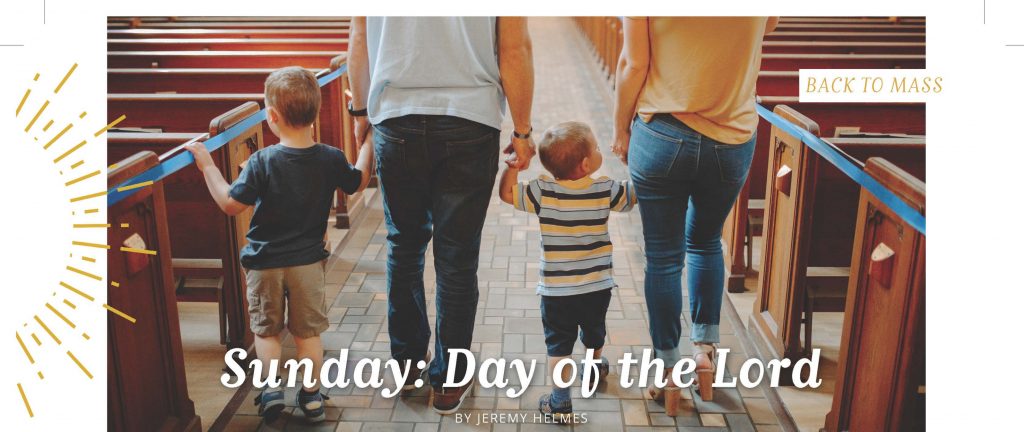Sunday: Day of the Lord
I’m not old enough to remember a time when society essentially shut down on Sundays, but I’ve heard the stories! No work, no shopping, nowhere to go but church and Grandma’s house. While there are elements of our 24-7 culture I enjoy (grocery stores open late and extended customer service hours), I also believe there should be guardrails to keep us from having unlimited access to every single thing we want all the time.
Young children often have no idea what day of the week it is, for it is of little consequence to them. However, in our family, Sunday stands out because it’s a day we go to Mass. That being said, Sunday still includes afternoon sports for the kids, Cub Scout meetings and other mundane domestic tasks. This can make it a struggle to hold up Sunday as unique.
From the days of the apostles, the Christian community set Sunday apart. At first, it was the day of worship on which the first Christians gathered for the “breaking of the bread.” Over time, it also became the official day of rest in civic life. This yoking of worship and rest shaped the rhythm of the week for much of Western Civilization.
In a 1998 apostolic letter to the Church, Dies Domini (“The Day of the Lord”), Pope St. John Paul II offers a few ways to understand how Christians should approach Sunday. “Sunday is the day of joy and the day of rest precisely because it is ‘the Lord’s Day,’ the day of the Risen Lord.” (DD 82). The popular cultural expression “Sunday fun day” is only possible because our joy and rest derive from our life in Jesus Christ.
Among the characteristics St. John Paul describes are:
DAY OF THE LORD: It was on the seventh day God rested, and so, too, should we. But this rest isn’t simply for its own sake. God rested on the seventh day to reflect upon what He created and to affirm its goodness. Sunday is our opportunity to reflect upon our past week, our successes and failures at discipleship, and to bring our life to the altar of God at Mass.
DAY OF DAYS: Sunday is the first and last day of the week, just as Christ is both alpha and omega, beginning and end. Jesus’ resurrection on “the first day of the week” gives us all the reason we need to mark Sunday as holy. As the eighth day, Sunday also reminds us of the goal of eternal life – something to ponder in quiet moments on a restful Sunday.
DAY OF THE EUCHARIST: While the process of celebrating Mass on Sunday is no different than on other days, the Sunday Eucharist is the center of life in the Christian community because the entire Church comes together, and it is the day of the Resurrection,
Even so, we are constantly tempted to treat Sunday like any other day – one more day to “get ahead,” one more day to catch up on what we couldn’t accomplish during the other six days. In a society that often prizes human achievement above all else, Sunday becomes a day to catch up on sleep and basic functions neglected over the preceding days. And, now, societal guardrails are gone. Sunday has all the temptations of the other days: stores open for shopping, computers open for working, restaurants open for dining. And because of society’s appetite for these things, many work on Sunday.
As we think about how our family’s life will be different “post-COVID-19,” we have an opportunity to embrace this slower pace, to rediscover the power of Sunday. If we want it, Sunday can be the day of the Church, of the Eucharist, for our family, for our parish, for God.
The bishops of Ohio have, until further notice, dispensed Catholics from the obligation to attend Mass on Sundays and holy days. When you attend Mass in person, please wear a mask, abide by the social distancing protocols of that parish and use hand sanitizer.
This article appeared in the March 2021 edition of The Catholic Telegraph Magazine. For your complimentary subscription, click here.














